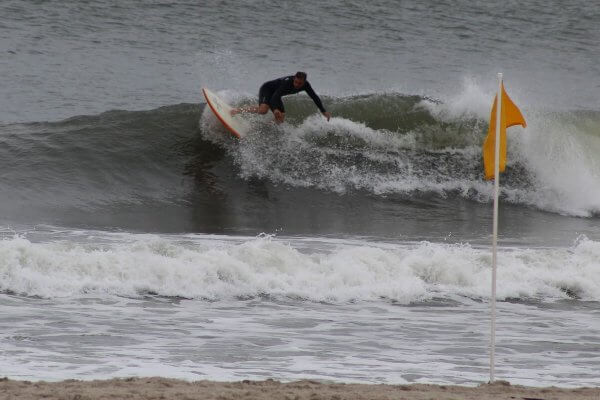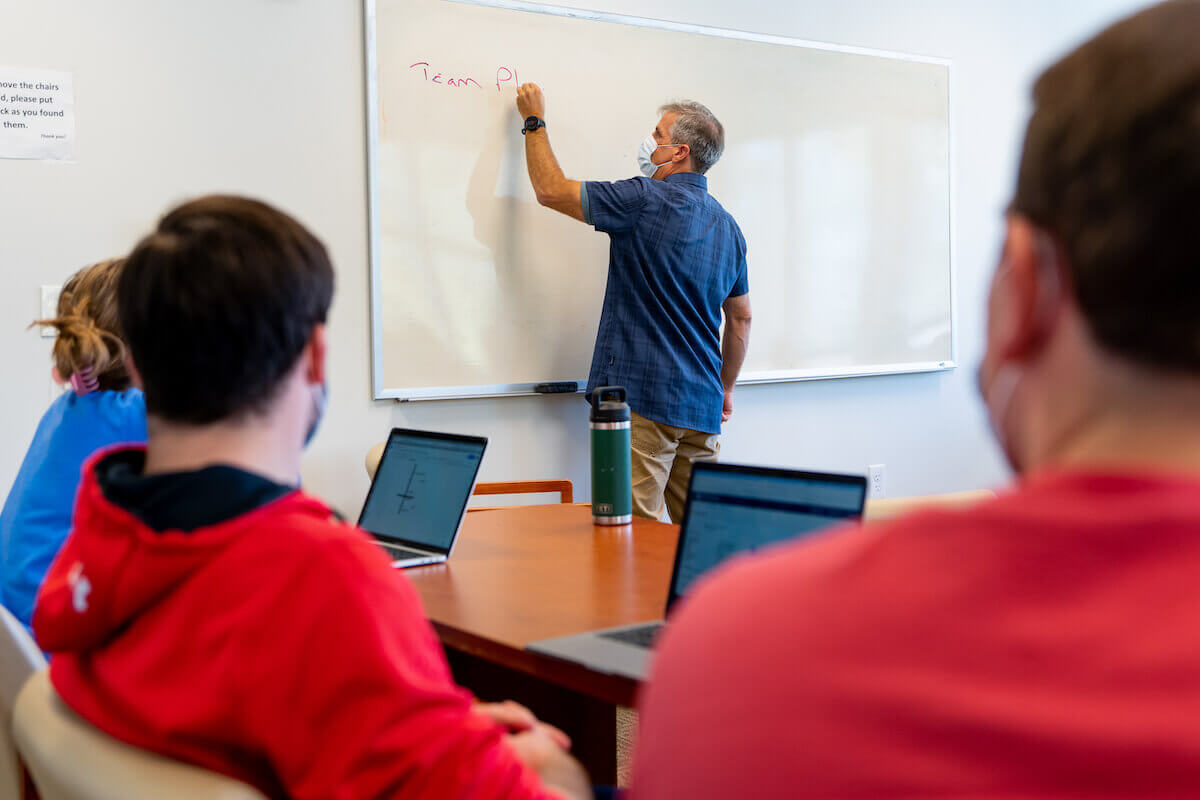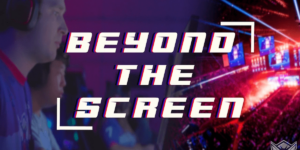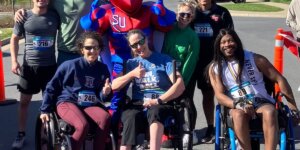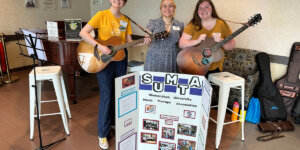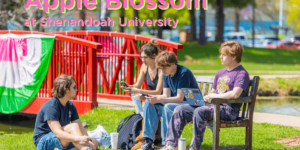Welcome to the Friday Faculty Spotlight, which today is on Professor of Political Science & Henkel Family Chair in International Affairs Eric K. Leonard, Ph.D. In this week’s spotlight Q&A, Dr. Leonard talks about how his interview at Shenandoah almost didn’t happen, how he always strives to make learning (and teaching) fun, how he always keeps the experience his students have (and his own history as a student) at the top of his mind, the importance of learning how to learn, staying current with the latest teaching methods, and surfing.
If there’s a faculty member you feel the university community needs to get to know better, just fill out the Friday Faculty Spotlight submission form. Friday Faculty Spotlights appear in the SUN-e and on the university’s website twice a month. If you have any questions, please contact omc@su.edu.
Q: How long have you been with Shenandoah?
This is my 19th year at Shenandoah. Fun fact – I missed my first interview at SU when my wife went into labor with my twins. Lucky for me, Shenandoah was understanding and I was able to reschedule my interview. I also live in New Jersey on Long Beach Island. My family moved there nine years ago and it is that move to the beach that has positively impacted my teaching by allowing me to explore hybrid learning and the flipped classroom method.
Q: What kind of research are you currently engaged in?
At this point in my career, most of my research and publications are pedagogical in nature. I recently published two book chapters on pedagogy within the international relations classroom and I am writing an introduction to international politics textbook. For the first part of my career, I researched the formation and evolution of the International Criminal Court and the impact this institution has on global governance and U.S. foreign policy. I still enjoy reading and teaching about these issues, but I have a real passion for teaching and learning so I took my research in a different direction.
Q: Over the years, has how you approach your study of international relations/global studies and how you teach changed? If so, in what ways and why?
The biggest change in how I teach is the increased emphasis on process rather than content. What I mean is that although the content of the course remains important, what I hope students get from the course is found more in the process in which they learn the material rather than the material itself.
During the first week of the semester I like to tell students that if I meet them on the street in five years and ask them to explain the intricacies of social constructivism (or any other difficult concept within my course), I am doubtful that they will retain that knowledge. But if I tell them that they have 24 hours to re-learn social constructivism and then articulate its meaning to me, I expect that process would be easy. I want students to gain the ability to learn rather than simply memorizing and regurgitating the course content.
Q: You hold Flipped Learning and VoiceThread certifications. What are these, and why did you pursue them?
About a decade ago, I started teaching with the hybrid learning delivery method. I started using this method to allow for a move to Long Beach Island, New Jersey. My wife and I really wanted to raise our kids near the ocean. I remember former College of Arts & Sciences Dean Cal Allen telling me that he would approve this change in teaching style only if I did it “right.” To me, that meant immersing yourself in the pedagogical methods that you employ so that you have a comprehensive understanding of not only how to implement those methods but also why those methods work. This brings me to the certifications that you mention. Flipped learning is a method of teaching that emphasizes student “ownership” of their learning. It also emphasizes active learning when students meet face-to-face. This method is tricky and difficult to do well, so I proceeded through a certification course that would provide me with the knowledge and tools to do this in a way that benefited my students. The VoiceThread software is a way to bring that active learning into an online course. So again, I felt it important to learn from those that use this software because this knowledge of VoiceThread and its pedagogical value would allow me to employ it in such a way that it would benefit my students. So the short answer is that having such certifications keeps me current, keeps me energized, and benefits my students. And just a quick aside – if I lived across the street from campus I would still use the hybrid method of teaching because I think it is a tremendous benefit to my students.
Q: You’re also a Transformative Teaching and Learning Advisory Board member. Why did you decide to serve in this role?
Serving in that role, and all of the other awesome things I get to do with Karrin Lukacs and the Transformative Teaching and Learning crew are the highlight of my job. In this role I get to talk pedagogy, course design, cutting-edge methods, and all things teaching. Who wouldn’t love that?!
Q: What do you consider to be essential to reaching and inspiring students?
Being transparent, open, and understanding. First, you should inform students why you are doing what you are doing. Transparent in that you explain why you teach the course as you do, why you use certain course materials, and why you have them complete the course assignments. Open in that you must make yourself human and relatable to your students. I have shared with my students some very personal aspects of my life. They know about my family, what my kids and my wife are doing, what I am passionate about, and they know that sometimes I struggle with my workload-family life balance. This type of openness allows students to see me as more than their professor. And most importantly, you need to be understanding. I was not a good student and nobody from my youth thought I would become a college professor. My mom always said I was the classic underachiever and she was right. In fact, I am a two-time college dropout. If I am being honest, I originally went to undergrad to play soccer and party. I cling to this history in order to remind myself that college is hard. Students have a lot going on and faculty need to remember that your class is only one small part of their lives. I now have two of my own kids in college, so hearing about their first-year experience is also a great reminder of student difficulties. I feel that my job is to help them succeed, not make their lives more difficult.
Q: You’ve been noted as an advocate for your students. How do you advocate for them?
As I just mentioned, my primary role as an educator is to create an environment in which students can succeed. That means creating a classroom that allows all students to flourish and hopefully reach their potential. The only way one does that is to understand how students learn and play with methods that might enhance this student learning. But in this process, I must also be responsive to what students need in order to achieve success. The learning process is a collaborative one, and so I think my advocacy for students starts with my willingness to listen to them and use their perspective to create an environment that promotes their success.
Q: What keeps you going as an educator?
Staying current on pedagogical methods and enjoying my time in the classroom. I try to bring in a new pedagogical method every year. In the past few years I have learned about and implemented a flipped learning method, active learning tools within an online course, and ungrading. It is that constant change and intellectual stimulation that keeps me excited about higher education.
Q: What do you hope your students take with them from your classes?
That they learn how to learn. This outcome is part of every course that I teach at SU.
The educational process of students is about more than content and if we can make them better able to learn on their own, this will help create lifelong learners, critical readers, critical thinkers, and productive members of our democratic society. But students should also have fun in class. College is fun, and learning can be fun, so I always try to laugh with my students and enjoy the time that I spend with them.
Q: How do you spend your downtime?
I like to stay active. My favorite thing to do is surf. I am lucky enough to live two blocks from the ocean, so I get to surf year-round. There is nowhere I would rather be than in the water. I also help with my friend’s surf shop in the summer months by teaching people how to surf. But I also do triathlons (I have completed two half-Ironman races) and when my knees allow it, I love to play soccer.
